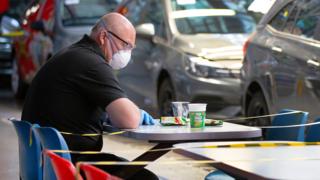 Image copyright
Getty Images
Image copyright
Getty Images
UK Prime Minister Boris Johnson has announced his plans to restart the economy and ease lockdown restrictions in England. But how could everyday life change?
Can more people go back to work?
- From Monday, people in England who "can't work from home" will be "actively encouraged to go to work"
- But they should still avoid public transport if possible because of social distancing
- And the government says it is working on guidance for employers to make workplaces "Covid-secure"
Previous draft government proposals to bring UK businesses out of lockdown suggested hot-desking would no longer continue.
Companies will also need to look at staggering shifts, rethink how equipment is shared and plan safe walking routes for staff - in offices, on factory floors and at building sites.
The issue of how businesses can secure personal protective equipment without competing with the NHS has raised concerns.
And unions say employers must be compelled to protect staff.
When will schools and universities return?
- Mr Johnson says primary schools in England may be ready to reopen "in stages" - but not until 1 June at the earliest
- This could begin with Reception, Year 1 and Year 6 pupils going back
- The prime minister also says it's the government's "ambition" to give secondary school pupils doing exams next year "at least some time with their teachers" before the summer holidays
The Welsh government has ruled out school reopenings happening on 1 June.
Scotland's First Minister, Nicola Sturgeon, has said she does not expect schools to be reopening as soon as 1 June.
No detail is available on how school reopening would work in England. But there has been speculation previously that measures to keep pupils and teachers safe could include:
- limiting class sizes
- groups of pupils attending on different days
- redesigned classrooms
- staggered break times
Meanwhile, there is uncertainty over whether students will be able to go to university in person in September or whether they will be taught partially or completely online.
Can you meet friends and relatives?
The new guidelines are expected to say that two people from different households would be able to meet in outdoor settings like parks as long as they stay more than two metres apart.
Will people be able to exercise more?
- From Wednesday, people in England will be able to spend more time outdoors "for leisure purposes"
- They can "take more and even unlimited amounts of outdoor exercise" rather than only exercising once a day
- People will also be free to sit in parks, and be able to "play sports" with people from the same household
- But social distancing rules - keeping at least two metres away from people outside your household - must still be followed
And Culture Secretary Oliver Dowden says sports like golf, basketball, tennis and fishing will now be possible for people in the same household.
The Welsh and Scottish governments have said people can exercise outdoors more than once a day from Monday.
How will the virus threat be publicised?
- A "Covid alert system", with the level of danger rated 1 to 5 - 5 being the most critical - will be introduced, Mr Johnson said
- This will determine how "tough" social distancing measures need to be - the lower the number the more they will be relaxed, and vice-versa
- The UK is currently at Level 4
When can I go shopping again?
- The prime minister says the "phased reopening" of shops - other than food stores and other "essential" outlets - may begin in England on 1 June, at the earliest
- This will only happen where social distancing rules can be followed
Garden centres in Wales will open from Monday. Decisions are awaited in Scotland and Northern Ireland. Mr Johnson made no mention of garden centres in England in his speech.
Some DIY stores, meanwhile, have already reopened - but they are accepting card payments only and have shorter trading hours.
What about pubs, cafes, restaurants, theatres and cinemas?
- Mr Johnson says the government "hopes" to reopen "at least some of the hospitality industry and other public places" in England but this will happen later than for shops and schools - by July at the earliest
- This will also depend on scientific advice and the possibility of keeping to social distancing measures
Draft government guidance previously seen by BBC News had said bar areas, seated areas in restaurants and cafes must remain closed even as the economy is opened up - and venues should serve takeaways only.
Will taking flights get easier?
- Mr Johnson says it will "soon be the time" - with coronavirus transmission rates falling - to impose quarantine on people coming to the UK by air
No more detail was given in Mr Johnson's speech on what form this quarantine would take or how it would be enforced.
Overall, social distancing is a big challenge for airports and airlines, with Heathrow boss John Holland-Kaye saying it is "physically impossible".
EasyJet plans to leave middle seats empty, but Ryanair boss Michael O'Leary says this would be "idiotic".
There has been speculation that air passengers may have to:
UK airlines say they have been told by the government that people arriving in the UK from any country other than the Republic of Ireland from the end of this month will have to self-isolate for 14 days - Mr Johnson did not give this much detail in his speech.
Trade body Airlines UK says such a move would "effectively kill air travel".
Meanwhile, the government has said people should not book holidays at home or abroad until social distancing rules are relaxed.